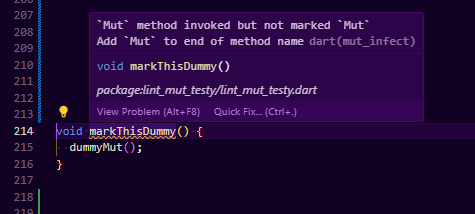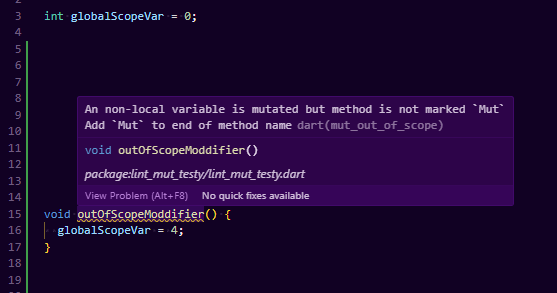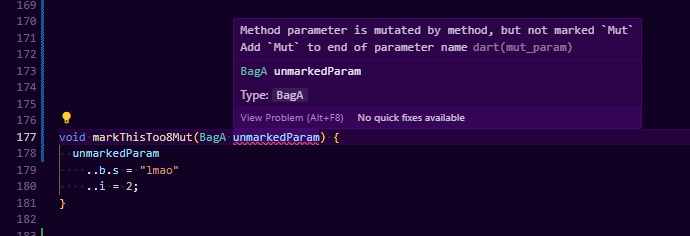A Dart linter enforcing certain naming conventions when dealing with methods that mutate variables.
There are 4 lints included in this package:
- mut_infect
void callAMut() { /* Calling a `mut` method should mark the caller as `Mut` */ callBMut(); } - mut_out_of_scope
void assignGlobalMut() { /* Assigning to a variable not owned by this scope should mark the caller as `Mut` */ globalVar = 3; } - mut_param
void changeIncomingParamterValue(AnObject aoMut) { /* Changing the parameter's properties should mark the parameter as `Mut` */ aoMut.innerField = "hi"; } - unnecessary_mut_infect
void funcDoesNotMut() { /* this function should not be marked with `Mut` */ }
Getting Started
Taken from custom_lint:
- The application must contain an
analysis_options.yamlwith the following
analyzer:
plugins:
- custom_lint
- The application also needs to add custom_lint and our package(s) as dev dependency in their application:
# The pubspec.yaml of an application using our lints
name: example_app
environment:
sdk: ">=2.16.0 <3.0.0"
dev_dependencies:
custom_lint:
lint_mut_infect:
Disabling a lint
If you want to disable certain lints, add the following to the analysis_options.yaml file:
lint_mut_infect:
rules:
- unnecessary_mut_infect: false # disable this rule
All rules are enabled by default.
Lints
mut_infect
Produces: Warning
Enforces infectious naming conventions on Method and Function declarations.
Something that invokes a Mut element should also be called Mut.

This produces the following message: 'Mut' method invoked but not marked 'Mut'
The suggested fix is to rename the calling function:
function markThisDummyMut() {
dummyMut();
}
This way you can establish a chain of all functions that mutate variables.
Exemptions
This lint is not applied when the element is:
- Marked with
@override - functions named
main - A
setter
mut_out_of_scope
Produces: Warning
This lint checks that variables that are modified within a function are declared within that function, or are contained entirely within the lexical scope of the function in question. For instance:

In this example, globalScopeVar is not declared within the outOfScopeModifier function, but is modified anyway. This produces a warning that the function should be marked with Mut.
This lint also understands locally defined functions, and won't cause undue warnings for strictly-local declarations:

In the above image, although i is modified by inner() , inner will not be marked as requiring Mut, because all declarations are local to the lexical scope of the top-level containing function.
Exemptions
This lint is not applied when the element is:
- Marked with
@override - functions named
main - A
setter
mut_param
Produces: Error
This lint checks that any variable that is passed a parameter and is modified by the function is marked with Mut.
This lint is stronger than the others because it is very important for a caller to know whether some object of theirs is going to be modified or not.

Exemptions
-
Parameters with Dart primitive types are exempt because they are passed-by-value. These include:
- bool
- int
- double
- num
- String
-
Simply reassigning the variable is exempt as well:
void reassignment(AnObject ao) { ao = AnObject(); }
unnecessary_mut_infect
Produces: Warning
This lint checks that any functions or methods named Mut actually deserve to be marked. This lint can help keep refactors to your codebase from spiraling out of control with Muts everywhere.

n.b.
Because this package isn't always aware of what constitutes mutating functionality or not, you should tell the the analyzer to ignore this lint when you need to.
For example:
// ignore: unnecessary_mut_infect
void reallyIsMut() {
someCallYouCantRenameButIsDefinitelyAMutatingCall();
}
Exemptions
Any function or method marked @override, or any function named main will not be flagged.
This means you wont be overloaded with warnings when dealing with names you don't control.
Limitations
This package doesn't integrate with dart fix, as we can't reliably get all symbol references for renaming. You are encouraged to use F2 rename functionality on your own to add or remove Mut as appropriate.
Known Bugs
#1
Some functions with inner scope Mut calls mutating a variable owned entirely by the calling scope still require their parent scope to be marked as Mut, even though they're mutating fully-owned local variables.
Debugging
To debug,
follow the steps at https://pub.dev/packages/custom_lint
- Add
custom_lintanddart_lint_infect_mutto Dev Dependencies of target project - Run
custom_lint --watch Optionaladd the dart_lint repo to the Workspace and set breakpoints within
Contributing to this plugin
This plugin uses the custom_lint package. To help with the underlying functionality, consider helping out that repo. To contribute to this repo specifically, visit https://github.com/0xNF/dart_lint_mut_infect